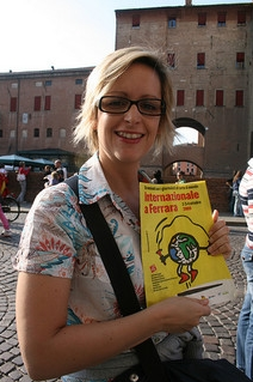 Internazionale Festival in Ferrara Internazionale Festival in Ferrara Published 18th December, 2012 on the European Journalism Centre magazine. Author: Alessia Cerantola The success of the 2012 round of journalism events in Italy sparks hope within many communities of Italian journalists. Faced with mounting unemployment and an old-fashioned media market, many journalists consider these meetings to be a wave of energy and an important resource for improving their skillsets. Despite Italy’s questionable record of freedom of expression and a loss of credibility of some traditional media outlets, conferences and journalism festivals are flourishing. By gathering journalists and other professionals from different fields and countries, the festivals become a platform for debates involving journalists from Italy and abroad and readers from any parts of the country. The panorama of media-related events in Italy presents unique chances for participants to listen, to be a part of the conversation about the future of journalism and, of course, to network. Some of the festivals are organised by media companies for their readers, such as the festival of Il Fatto Quotidiano in Lucca. Here, through programmed panels, attendees can relive their reading experience via live sessions with flesh-and-blood newsmakers and journalists. Events are also organised on specific themes, such as the Youth Media Days held in Naples this year. The figures reveal the success of these events. The Internazionale meeting in Ferrara, organized by the magazine, welcomed 170 guests from 38 countries, and the number of attendees has risen from 17,000 people in 2007 to 66,000 in 2012. The three-day Festival of TV in the city of Dogliani and new media recorded about 20, 000 visitors in its first edition this year. To what extent this growing success might be related to the particular social and political situation in Italy is difficult to determine. But it’s worth reflecting on the reasons that bring people disaffected by national journalism to populate these social meetings and actively participate. Five benefits of journalism events in Italy: No barriers among journalists
In the hierarchical Italian media society, these happenings represent a rare chance to temporally upset the order. “It’s the meeting of a community where the borders with top journalists tumble down,” says Arianna Ciccone, co-founder of the International Journalism Festival of Perugia. “What happens in the secret rooms of mainstream media outlets is not a daily topic. For the common person this is a chance to share ideas with a different audience and to feel involved.” A redemption for top journalists Pairing national and international top journalists with other colleagues or readers is also a good opportunity for restoring the relationship between journalists and the readership. “The image of the journalist is often vilified, because it is as if doing this job people lose their contact with reality,” says Federica Mariani, the organiser of the Festival of TV. She also works with Dogliani, a conference that reproduces a TV schedule made by correspondents dealing with different topics, from news to entertainment, crossing over with new media. During the event, Italy’s showmen, anchormen and other new media talents also appear. She is very positive about the effect of this meeting. “When journalists see people who travel the distance to come and meet them, then they realise how important their role is.” Mind opening A journalism event can helps broaden minds and contribute to a new kind of tourism flux. “This festival taps into a new kind of cultural tourism,’ says Giovanni De Mauro, editor-in-chief of Internazionale weekly magazine. “The direct access to the main authors publishing for the magazine encourages people to come. This has an important role in ‘sprovincializzazione’ (literally going out of the province, opening someone’s mind), and make the magazine closer to its readers and helps circulate people and ideas.” Location: beautiful small cities The locations of the conference are often prestigious places, ancient villas, palaces or theatres in small and historical cities, offering attendees an articulated experience. Among others, venues have included Ferrara in northern Italy, Dogliani in the northwest, Perugia in the centre or Naples in the south. All these cities are known for their cultural entertainment, beautiful landscapes and strong gastronomic traditions. Between sessions the other attendees can move to halls, cross the city and chat on the streets and cafeterias. It was especially relevant to Ferrara, in the region badly shaken by the quake this year, to remain the hosting city of the event. “Opening to culture and to the world as a way to start rebuilding is the first confirmation that it’s possible to find out opportunities for changes and growth,” said Massimo Mazzetti, a politician of Ferrara, introducing the media happening. Free access and volunteer jobs Last, attending these events is free. Except for the hotel and travel expenses, these events offer hours of worthwhile training and workshops to journalists and others who are simply interested. In some cases panels are composed of professionals who give up their time for free, and for the same benefits.
0 Comments
Your comment will be posted after it is approved.
Leave a Reply. |
Archives
August 2023
|
 RSS Feed
RSS Feed
